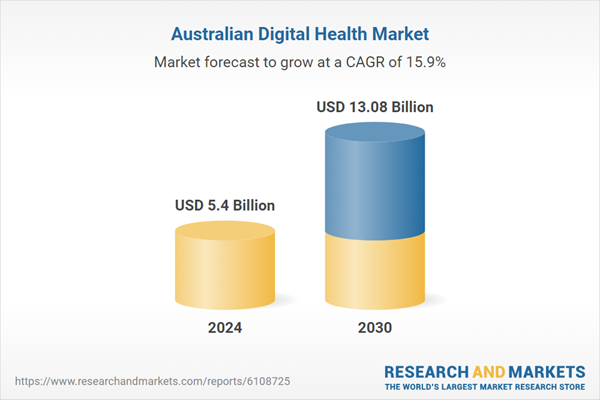Speak directly to the analyst to clarify any post sales queries you may have.
10% Free customizationThis report comes with 10% free customization, enabling you to add data that meets your specific business needs.
Strategic initiatives focused on interoperability, data governance, and cybersecurity are shaping a more integrated, patient-centric ecosystem. As the healthcare sector shifts toward decentralized and digitally enabled models, providers, payers, and technology vendors are investing in scalable platforms that improve clinical outcomes and operational efficiency. Players emphasizing regulatory compliance, intuitive design, and seamless integration will be best positioned to capture growth in this maturing digital health environment.
Key Market Drivers
High Burden of Chronic Diseases
The increasing prevalence of chronic diseases in Australia is a primary catalyst for digital health adoption. Conditions such as diabetes, cardiovascular diseases, mental health disorders, and respiratory illnesses account for a large share of healthcare usage and spending. As of 2022, nearly 49.9% of Australians were living with at least one chronic condition, according to the Australian Bureau of Statistics. These long-term illnesses require continuous monitoring, frequent interventions, and coordinated care - areas where digital technologies excel. Digital health tools enable scalable, cost-effective solutions for disease management through remote monitoring, data-driven insights, and teleconsultations, ultimately easing the burden on traditional care models and improving patient engagement and outcomes.Key Market Challenges
Interoperability and System Fragmentation
A significant hurdle for the Australia Digital Health Market is the fragmented digital infrastructure across public and private healthcare entities. Disparate systems, platforms, and data standards hinder seamless communication and data exchange. This fragmentation disrupts care continuity, results in inefficiencies like duplicate testing, and hampers clinical decision-making. It also reduces the effectiveness of national initiatives such as My Health Record, which rely on real-time, standardized data from multiple providers. Additionally, customized IT integrations and middleware to bridge incompatible systems increase operational costs. Without uniform data frameworks and interoperability standards, scaling digital health solutions and attracting private investment remain challenging.Key Market Trends
Expansion of AI and Data-Driven Healthcare
Artificial Intelligence and data analytics are reshaping Australia’s digital health landscape, supporting clinical decision-making and enabling personalized care. Hospitals and startups are deploying AI tools across radiology, pathology, and early disease detection, with predictive models helping optimize resource allocation and identify at-risk patients. My Health Record and other national databases are becoming rich sources for population health analysis, driving both policy and innovation. The growing adoption of AI-based triage systems, diagnostic support, and remote patient monitoring solutions underscores the sector’s shift toward intelligent, proactive care. As regulatory confidence in AI grows, these technologies are expected to become standard tools across Australian healthcare settings.Key Market Players
- Epic Systems Corporation
- AT&T
- AirStrip Technologies
- Google Australia Pty Ltd
- Vocera Communications Australia Pty Limited
- IBM Australia Limited
- CISCO Systems, Inc
- Apple Inc
- McKesson Corporation
- Qualcomm Technologies, Inc.
Report Scope:
In this report, the Australia Digital Health Market has been segmented into the following categories, in addition to the industry trends which have also been detailed below:Australia Digital Health Market, By Technology:
- Tele-healthcare
- mHealth
- Digital Health Systems
- Healthcare Analytics
Australia Digital Health Market, By Component:
- Software
- Hardware
- Services
Australia Digital Health Market, By Application:
- Obesity
- Diabetes
- Cardiovascular
- Respiratory Diseases
- Others
Australia Digital Health Market, By End User:
- Patients
- Providers
- Payers
- Others
Australia Digital Health Market, By Region:
- Australia Capital Territory & New South Wales
- Northern Territory & Southern Australia
- Western Australia
- Queensland
- Victoria & Tasmania
Competitive Landscape
Company Profiles: Detailed analysis of the major companies present in the Australia Digital Health Market.Available Customizations:
With the given market data, the publisher offers customizations according to a company's specific needs. The following customization options are available for the report.Company Information
- Detailed analysis and profiling of additional market players (up to five).
This product will be delivered within 1-3 business days.
Table of Contents
Companies Mentioned
- Epic Systems Corporation
- AT&T
- AirStrip Technologies
- Google Australia Pty Ltd
- Vocera Communications Australia Pty Limited
- IBM Australia Limited
- CISCO Systems, Inc
- Apple Inc
- McKesson Corporation
- Qualcomm Technologies, Inc.
Table Information
| Report Attribute | Details |
|---|---|
| No. of Pages | 85 |
| Published | July 2025 |
| Forecast Period | 2024 - 2030 |
| Estimated Market Value ( USD | $ 5.4 Billion |
| Forecasted Market Value ( USD | $ 13.08 Billion |
| Compound Annual Growth Rate | 15.8% |
| Regions Covered | Australia |
| No. of Companies Mentioned | 10 |









